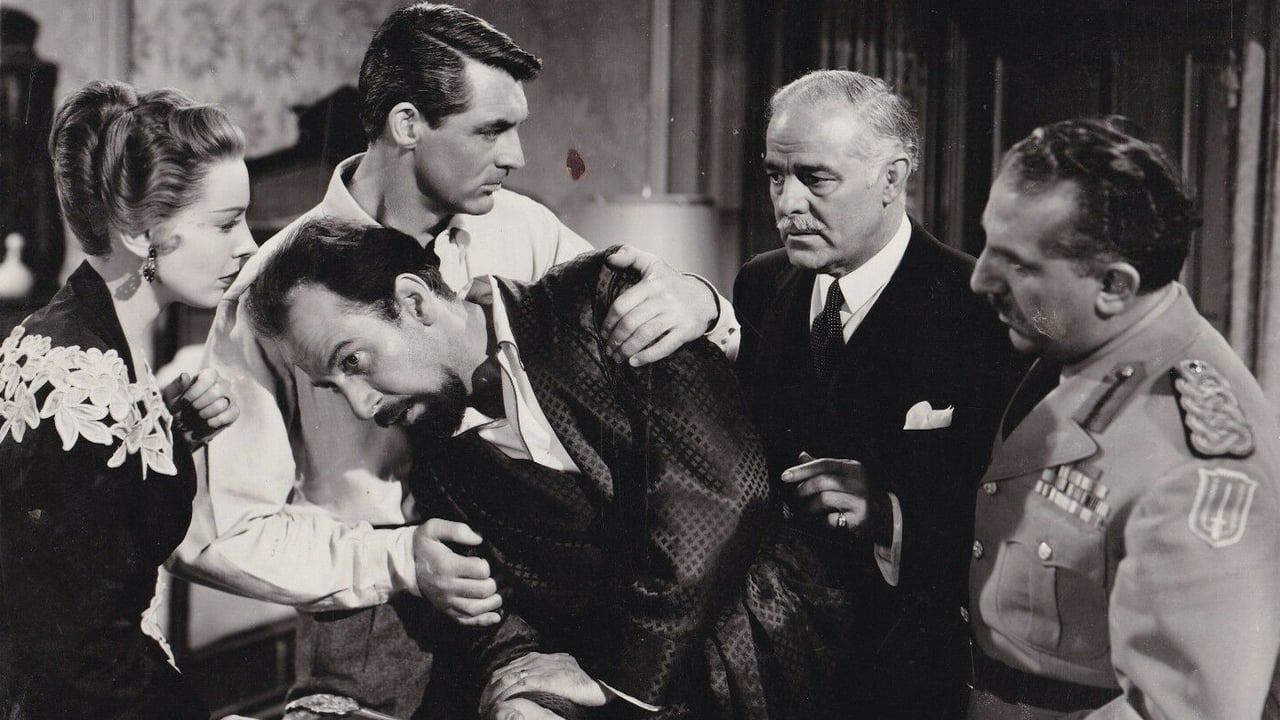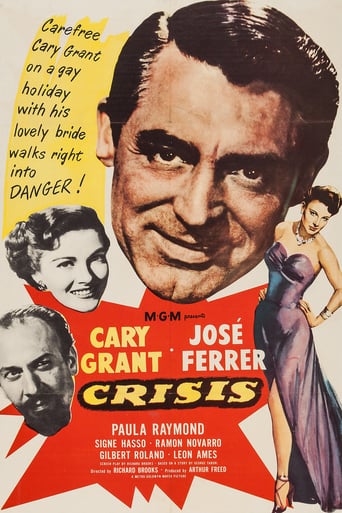

Lightweight leading man Cary Grant decided to try playing a serious role for a change in writer & director Richard Brooks' first directorial effort "Crisis" about a gifted surgeon who agrees to operate on a notorious South American dictator who suffers from a brain tumor. Nothing about "Crisis" is remotely like anything that Grant had done before in Hollywood. Humor is not used to relieve the tension or the drama in this straightforward medical yarn. Brooks adapted George Tabori's short story "The Doubters," and he pulls few punches realistic yarn. It should come as no surprise that Latin Americans didn't like approve of this controversial movie. Ultimately, Grant's stab of being serious amounted to a flop, despite the poster ads that proclaimed "Carefree Cary Grant on a gay vacation with his lovely bride walks right into Danger!" The arrogant dictator, Raoul Farrago (José Ferrer of "The Shrike"), insists that the good doctor operate even though several more qualified surgeons are available to treat him. As it turns out, none of those doctors want to save Farrago. You see, Dr. Eugene Norland Ferguson (Cary Grant of "Gunga Din") and his wife Helen (Paula Raymond of "The Duchess of Idaho") are on holiday from their ship when they find themselves arrested by Farrago's armed enforcer Colonel Adragon (Ramon Navarro of the silent "Ben-Hur") who doesn't take no for an answer. Meantime, a representative from an oil company, Sam Proctor (Leon Ames of "Lady in the Lake") advises the Fergusons that he go through with the dangerous operation. Ferguson doesn't want his wife around if anything goes wrong. She boards a train with an armed escort to leave the country. Earlier, Ferguson and his wife had dined out in a restaurant where the subverves hang their hats, the doctor meets the ring leader of the opposition, Roland Gonzales (Gilbert Roland of "Beneath the 12 Mile Reef") tries to convince Ferguson to botch the operation. Truthful to his oath as a doctor, Ferguson goes ahead with the operation. Farrago survives but ignores his physician's orders. The ending is appropriate to this Metro-Goldwyn-Mayer social consciousness drama and it should come as no surprise what happens to the dreaded Farrago. The ending has a touch of irony to it. "Crisis" lives up to its title, and Brooks never lets the tension slacken throughout this taut thriller. Reportedly, Grant threw himself into the role and approached genuine doctors who showed him a thing or two about the surgeon's profession.
... View MoreRenown brain surgeon, vacationing in an unnamed Latin American country with his wife, is stopped from leaving by the president's wife and minions after the savage dictator falls ill. The doctor reluctantly agrees to operate, not knowing that his spouse has been kidnapped by the Revolution, who want the leader's head on a plate. Although he stays in a somber low-key throughout (with the exception of a comic teeth-brushing bit), Cary Grant is just as interesting in a dramatic film as he is in more lighthearted fare--though the lack of offhand humor makes itself felt. Debuting director Richard Brooks, who also adapted the script from George Tabori's story, provides a steady pace which is neither gripping nor dawdling, and he handles his actors efficiently enough. A curious vehicle for its star and studio (MGM), the picture fails to unnerve us with its staged violence (which seems derivative of Fritz Lang) and angry, shouting mobs. What it does do well is present two important men on opposing sides reaching a temporary truce through medicine and illness. In this regard, "Crisis" is unusual and occasionally effective. ** from ****
... View MoreThey say it was to be a widower and his child ,like in the novel.But the producers got their vow and they paired Grant with the bland Paula Raymond.Actually the real female star is Signe Hasso,a beautiful fascinating woman.Jose Ferrer is ideally cast as the great dictator.The main weakness of the screenplay is the fact that Grant does not receive the message:his moral dilemma is not as harsh as it could have been.Nevertheless ,"Crisis " is a strong debut from a great director .Good lines:Ferrer: "You 've done me and my people a great service."Grant: "I haven't voted for you" Ferrer :"Neither have they"The ending does not take the easy way out: the "revolutionary " man is actually a perfect demagogue and the country is probably waiting for the next dictator.
... View MoreCrisis represents yet another attempt by Cary Grant to break away from his light leading man image and do something with more drama. His last attempt was None But the Lonely Heart which got great critical notices, an Oscar nomination for him and died at the box office. The public just didn't want to see him in stuff like Crisis.The film is one of a very few non-musical productions by Arthur Freed at MGM. And the original story was intended for Spencer Tracy who was to be a neurosurgeon traveling in Latin America with a 10 year old daughter. The powers that be decided a little romance was needed so Tracy was substituted by Grant and he was given a wife played by Paula Raymond instead of a daughter.He's a neurosurgeon and when the powers that be discover him in their country he's brought to the presidential palace to operate on Peron like dictator Jose Ferrer. Then the rebels capture Paula Raymond and Grant's got a dilemma.Signe Hasso who was cast in the role of the first lady bears more than a passing resemblance to Eva Peron does the best job in the film. Cast in Latino parts are such Hollywood Latinos as Raymond Novarro, Gilbert Roland, Antonio Moreno, and Pedro deCordoba. All perform well.Crisis marked Richard Brooks's directorial debut and he wrote the script as well. Unfortunately the same thing happened here as did to None But the Lonely Heart. Great reviews and it lost money. Brooks was established as a director though.
... View More